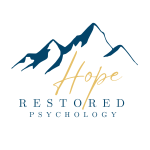- Home
- Featured Articles
- Seasonal Affective Disorder and Seasonal Mood Fluctuations
by The Hope Restored Psychology team
Published October 28, 2024
Seasonal Affective Disorder and Seasonal Mood Fluctuations
Daylight savings time is right around the corner! Most of us are usually pretty happy about getting that extra hour of sleep on that Sunday, but very quickly we’ll start finding ourselves waking up before the sun rises and getting out of the office after the sun sets. You might notice your mood taking a dip; maybe you feel less motivated, and more sad. You’re not alone.

Seasonal Affective Disorder (SAD) is a type of depression that affects people at the same time of the year every year. Usually people encounter these effects when the fall begins and light in the day decreases – changing our circadian rhythms in our brains – and the cold increases – making it hard to go outside/see people/be active.
SAD creates a lack of energy, decreased motivation, a desire to just stay in bed and not do anything (relatable?), and a lower mood overall. The effects of the fall and winter months affect everyone to some extent – we want to stay at home, it’s hard to get up to go to work, it’s freezing outside and I just don’t want to go out, we eat a ton of carbs for comfort and soothing, and it feels like the days are short and long at the same time..
Some symptoms can include:
- Feeling down throughout the day or having a low mood
- Losing interest in things you normally enjoy
- Low energy or feeling sluggish
- Sleeping too much or having difficulties waking up
- Overeating, weight gain or increased carbohydrate intake
- Difficulties concentrating
- Feeling hopeless, worthless, or like you’re going through the motions
- Sometimes there can be thoughts of suicide or ending your life
- Withdrawal from relationships; interactions with people feel daunting
But, there is hope. There are things that we can do to combat SAD and these seasonal mood effects. Speaking to a Counsellor or Psychologist about strategies and how you’re feeling can give you a different perspective on what’s going on, as well as help you not to feel alone. We can also work on these effects using a Bio-psycho-social-spiritual framework – meaning we can look at our lives as a whole and in its various parts:
Biological (Exercise/Sleep/Diet/Nature):
- Getting some exercise (though sometimes it might feel forced)
- Take in an exercise class at your local gym (the YMCA has plenty for example!)
- Go on a walk with a friend
- Do a home workout – Fitness Blender is awesome on YouTube for beginners as well as those with more experience
- Get some sunlight outside (or using a phototherapy light in your house)
- Tracking your hours of sleep can help mitigate some of the effects of SAD
- Take a vitamin D supplement (in Canada we are often not getting enough – consult your doctor for dosage)
- Though you want those carbs, maybe balance it with a salad or roasted veggies!
- At this time of year, if you’re feeling down, be very careful of your alcohol use – alcohol is actually a depressant and will most likely make you feel worse!
Psychological (our mindset/perspective/internal thoughts):
- Using a thought record (a chart looking at our negative thoughts and working to balance or reframe them) can help us to track our thoughts in a given day and work to improve them
- Gratitude is a classic for helping the brain forward and alleviating depression/anxiety (Fun Fact: The parts of the brain responsible for anxiety/depression overlap with gratitude – so you can’t have both at the same time!)
- It’s easy to go through our days without truly checking in on how we’re actually feeling. Take a moment to notice what’s going on inside—are you feeling any physical sensations, like tension in your neck or heaviness in your chest? Are you experiencing strong emotions, like sadness, fear or anger? Surprisingly, simply naming these feelings out loud can make a difference. Acknowledging them might help you feel a little better and guide you toward what you need in that moment.
- Lastly, a psychologist at Hope Restored Psychology can also work with you on a psychological assessment to better understand your symptoms and give you tailored recommendations moving forward if depression symptoms are heavily affecting you.
- Sometimes, SAD can lead us to unhealthy coping strategies, like overusing alcohol, drugs, or engaging in self-harm. It’s normal to feel the impulse to turn to these methods, but before you do, try to remember the acronym HALT – Am I: Hungry, Angry, Lonely, or Tired? These are signals from your body and mind that something needs attention. Try addressing one of these basic needs first—it might help you to avoid unhealthy choices.
- Getting together with friends, especially on days that feel difficult, can be a helpful way to combat SAD. Sometimes you may feel like you have to force yourself to get together with people – we promise it gets better once you’re actually with them. Whether it’s sharing a meal or enjoying fun activities together, spending time with people who make you feel good is important. While taking time for ourselves can be beneficial sometimes, SAD often makes us want to isolate and it’s essential to stay connected with those who matter to us to get through the tough winter months – even when we feel fatigued and unmotivated.
- Try planning regular meet-ups, even if it’s just for a coffee or tea, going for a walk (bundle up).
- Try a new activity (like going to a new restaurant or experience, or taking an exercise class together), or a video chat.
- Though it’s hard, just letting people know you’re feeling down and not ok is amazing, and you’ll find it will lift your spirits (chances are, they might not be feeling amazing either!)
- For those who are more religious or ascribe to a particular belief system, you can pray. Prayer has a substantial effect on mental health and depression/anxiety especially. (The book “The Awakened Brain” by neuroscientist Dr. Lisa Miller is a great read on this.) Surrender your thoughts and feelings to God and allow Him to enter into your circumstances.
- You can also work on reading your holy book – whether the Bible, Quran, Guru Granth Sahib, Vedas, Torah, etc. These books can give you hope and help you feel connected to a higher power, and give you perspective that might be narrowing with SAD.
- Getting connected into a religious circle or group can also help to feel socially and psychologically as well as spiritually alleviated of your symptoms. People with a common purpose, perspective, and goals can help us get out of our own thoughts and feel enlightened.
- Talking to a religious leader or mentor may help you as well – they can bring wisdom into your circumstances and help you with your thoughts or feelings.
- Lastly, meditating on a section of your holy book, on a word that describes God, on things you can be thankful for, or on God being in control and not you, can help lift you out of the all-encompassing thoughts and feelings that can come with SAD.
- For those who are not particularly religious, you could try looking into a religion or faith to see what’s out there or where truth is/comes from. If you’re not up for that, you could try getting out into nature. Nature has a substantial effect on our mental and physical health – even listening to birds outside can help balance neurotransmitters in your brain!
- Working on mindfulness can also help alleviate SAD effects. Mindfulness is working to bring your mind into the present moment without judgment of your current circumstances or feelings. Focusing on your breath and taking deep breaths, focusing on the 5 senses around you (what you can see, hear, feel, smell and taste), and being still and doing nothing but looking out your window and watching what’s happening are some examples of mindfulness to help your brain decompress and come to the present moment.
- You can try meditating on a word that is meaningful to you, or on a positive emotion or memory from your life.

